Share
Working at ESO
Are you interested in working in areas of frontline technology and in a stimulating international environment? Do you feel your profile matches our requirements? Learn more about our current vacancies and apply online. Read more..
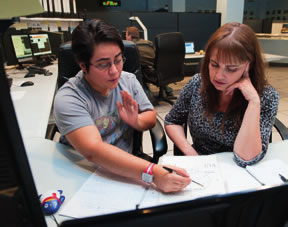
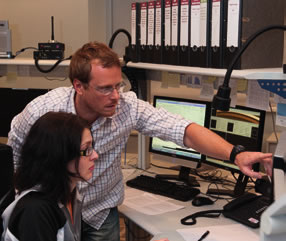

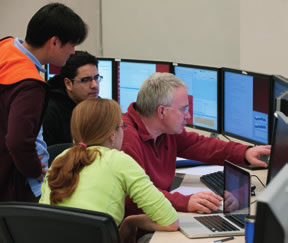
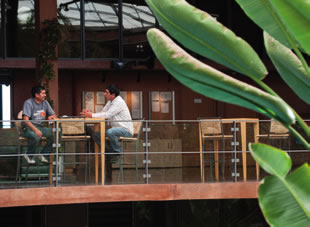
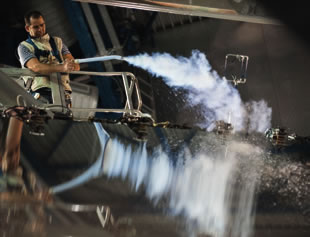
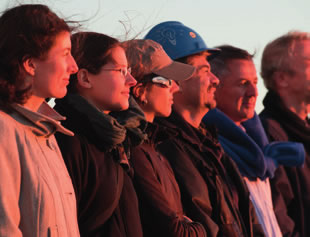
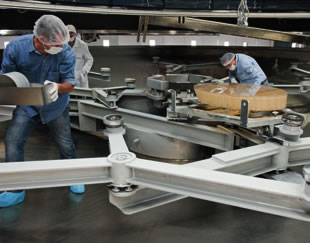
The European Organisation for Astronomical Research in the Southern Hemisphere (ESO) is the foremost intergovernmental astronomy organisation in Europe and the world's most productive ground-based astronomical observatory. ESO carries out an ambitious programme focused on the design, construction and operation of powerful ground-based observing facilities enabling astronomers to make important scientific discoveries.
ESO operates three unique world-class observing sites in northern Chile: La Silla, Paranal and Chajnantor (home to ALMA and APEX), and the ESO Headquarters are located in Garching, near Munich, Germany.
At Paranal, ESO operates the Very Large Telescope, the world's most advanced visible-light astronomical observatory, and will host and operate the southern array of the Cherenkov Telescope Array, the world's largest and most sensitive high energy gamma-ray observatory. ESO is a major partner in ALMA, the largest astronomical project in existence. And on Cerro Armazones, ESO is building the 39-metre Extremely Large Telescope (ELT), which will become "the world's biggest eye on the sky" and whose operations will be fully integrated into the Paranal Observatory.
The Electronic Engineering Department within the Directorate of Engineering at its Headquarters in Garching, near Munich, Germany, is advertising the position of
Electronics/Detector Systems Engineer
Garching
Deadline 16/03/2024
We are looking for an engineer to join the Electronic Detector Systems Group (EDES) within the Electronics Department, to cover a wide range of electronics roles and working in all aspects of designing and delivering new detector system electronics to our observatories and partner organisations. The department comprises a group of 33 electronic engineers, physicists and technicians who are responsible for the definition, design and implementation of complex control systems for advanced optical and infrared astronomical instrumentation, detectors and telescope systems required for ESO's Observatories in Chile.
As an Electronics Engineer, with a good mix of a digital electronics engineering background and/or analogue electronics, you will be working on the system required to operate the latest generation of astronomical detectors. We are presently developing a new detector controller based on the MicroTCA architecture with multiple complex FPGAs and processors. You will be heavily involved in the system architecture design for the FPGAs as well as the embedded Software/Firmware developments.
Prior experience in designing high-speed digital and/or low-noise analogue electronics, including schematic capture and PCB layout, would also be desirable.
Main Duties and Responsibilities:
The successful candidate will specifically work in the mentioned fields given below:
- Design and development of FPGA firmware and embedded software for astronomical detector systems.
- Functional verification of firmware components in simulation and by performing measurements in a lab environment.
- Support development of hardware and software interfacing with the system.
- Involvement in the design of electronic circuits for detector controllers by defining interfaces.
- Collaborate with team members to define specifications and review implementations.
- Document concepts, design decisions, specifications and test results to ESO's standards.
Duties and responsibilities are not limited to the above, and a flexible approach and willingness to adapt is required.
Reports to:
Head of the Detector Systems Group.
Key Competence and Experience:
We are looking for a candidate who is already familiar with the main fields described, that is firmware design for FPGA systems for complex mixed analogue/digital circuitry, with the following competencies.
Essential competences:
- Proficient in designing digital logic for FPGAs using VHDL.
- Strong understanding of FPGA design and architectural concepts for FPGA based SoCs.
- Experience in designing test benches for simulation and verification (UVVM, VUnit, cocotb).
- Specific experience with Xilinx FPGA platforms and vendor tools is preferred.
- Skilled in developing embedded software (C/C++, FreeRTOS/Linux).
- Version control and continuous integration tools (GitLab, Jenkins).
- Providing clear, concise and timely oral and written communications, identifying the key issues, examining options and proposing a way ahead.
- Effective and committed team player with ability to look for pragmatic solutions.
- Excellent cross-disciplinary communication skills both oral and written.
In addition to the listed essential competencies, the following desirable experience would also be very useful.
Desirable experiences:
- Detailed understanding of hardware design (high-speed signal integrity, analogue signal processing, EMC, PCB Layout).
- Familiarity with other HDLs, for example Verilog.
- Experience and knowledge about MicroTCA systems.
- Experience with software scripting languages, such as Python.
- SPICE modelling.
- Aspects of Infrared/Visible, (CCD and/or CMOS) detector system design.
For the position you should have a minimum of three years of professional work experience within the area of the aforementioned essential competences.
Qualifications
Essential educational level:
- University degree (bachelor) in preferably electronics or physics with proven electronics experience, or an equivalent educational level.
Language skills:
High (fluent) proficiency level in English both written and oral is essential, good knowledge of German is an asset, knowledge of Spanish is an advantage.
Remuneration and Contract:
We offer an attractive remuneration package including a competitive salary, comprehensive pension scheme and medical, educational, and other social benefits, as well as financial help in relocating your family and support to place your child/children in daycare.
Our Salary Structure
ESO's salary structure is based upon a range of career paths which reflect the nature and level of our jobs. Each career path is made up of two or three grades which are used to further reflect experience. Please follow this attached link for more details https://www.eso.org/public/jobs/conditions/intstaff/salary-structure/
ESO aims to support members of personnel in maintaining a good work-life balance (https://www.eso.org/public/jobs/conditions/intstaff/#work-life-balance) between their professional and private life. ESO is also committed to offering family-friendly support (https://www.eso.org/public/jobs/conditions/intstaff/#family-friendly-support), creating a work environment and policies which allow staff to balance their professional and private responsibilities through flexible and mobile working arrangements and financial support for families.
The contract is for a fixed term duration of three years, and is subject to successful completion of the probation period. There may be a possibility of extension(s) subject to individual performance and organisational requirements, in particular for the ELT Programme, and as defined in the applicable policies and staff rules and regulations. For any further information, please visit ESO's conditions of employment (https://www.eso.org/public/jobs/conditions/). Please note that the contract policy and in particular the regulations concerning fixed-term and indefinite contracts are currently under review which may lead to changes in the contractual conditions applicable to this position.
Duty Station:
Garching near Munich, Germany
Career Path: V
Application:
If you are interested in working in areas of frontline science and technology and in a stimulating international environment, please visit http://www.eso.org for further details.
Applicants are invited to apply online at http://jobs.eso.org/. Applications must be completed in English and should include a motivation letter and CV. Within your CV, please provide the names and contact details of three persons familiar with your work and willing to provide a recommendation letter upon request. Referees will not be contacted without your prior consent.
Deadline for applications is 16 March 2024.
Interviews are expected to start soon after this date.
ESO Values
An important element in any successful employment relationship is harmony in values between an organisation and its people.
The ESO Values are:
ESO strives for excellence through innovation.
ESO provides outstanding services to its communities.
ESO fosters diversity & inclusion.
ESO believes in the key role of sustainability for its future.
Achieving the above are recognized as only possible on the basis of personal values and attitudes that we expect from our employees: respect, integrity, accountability, commitment, collaboration, and clear & open communication.
Applicants to any ESO role are asked to reflect on their affinity with these values and advised they may be asked about them if called for interview.
Diversity
ESO has established diversity as an important value of the Organisation, is committed to providing an equal opportunities environment and is actively seeking to promote a diverse, equitable and inclusive workforce. Please visit https://www.eso.org/public/about-eso/sustainability/dei-at-eso/ for further details.
Nationality
No nationality is in principle excluded from employment at ESO, however, recruitment preference will be given to nationals of our Member States, host states and strategic partners: Australia, Austria, Belgium, the Czech Republic, Denmark, Finland, France, Germany, Ireland, Italy, the Netherlands, Poland, Portugal, Spain, Sweden, Switzerland, the United Kingdom and Chile, irrespective of gender, age, disability, sexual orientation, ethnicity or religion.
